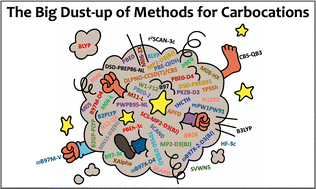A comprehensive benchmark investigation of quantum chemical methods for carbocations†
Abstract
The application of various density functional approximations (DFAs) and an emphasis on popular methods without any consensus have prevailed in computational studies dedicated to carbocations. More importantly, an extensive and rigorous benchmark investigation on density functionals for the class is still lacking. To close this gap, we present a comprehensive benchmark study of quantum chemical methods on a series of classical and nonclassical carbocations, the CARBO33 dataset. We evaluate a total of 107 DFT methods from all rungs giving particular attention to double hybrid density functionals as the potential of the class has been largely undermined in the context of carbocations. To support our findings, DLPNO-CCSD(T) at the complete basis set (CBS) limit and W1-F12 are used as reference methods. Our results indicate that the composite CBS-QB3 method performs poorly and should not be adopted for target energies. Oftentimes, the tested DFAs of a lower rung perform better than several DFAs in a higher rung of Perdew's “Jacob's ladder”. Nonetheless, double hybrids DSD-PBEP86-NL and ωB97X-2-D3(BJ) stand out by showing the overall best performance. Among the hybrids evaluated, about half of them show mean absolute deviation (MAD) below 1.1 kcal mol−1, including the popular hybrids M06-2X and mPW1PW91. In this family, MN15-D3(BJ) performs particularly well (MAD = 0.77 kcal mol−1) displaying reliable results across various tests. Highly popular B3LYP exhibited one of the worst performances (MAD = 4.74 kcal mol−1), and we do not recommend its application to carbocations. We also assess the 24 general-purpose basis sets of single- up to quadruple-ζ quality. The best compromise between accuracy and computational cost is achieved with cc-pVTZ followed by def2-TZVP. Computations on larger structures of general interest, including terpene carbocations, are also presented for selected DFT methods confirming general trends in the results.

- This article is part of the themed collection: Celebrating Latin American Chemistry


 Please wait while we load your content...
Please wait while we load your content...